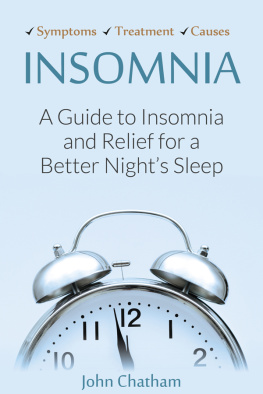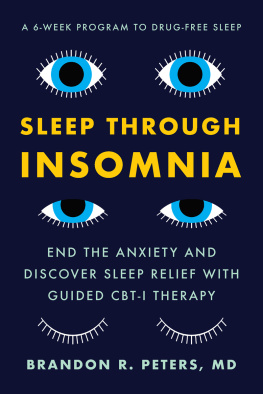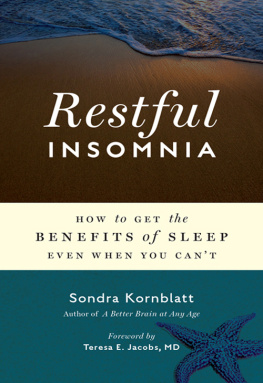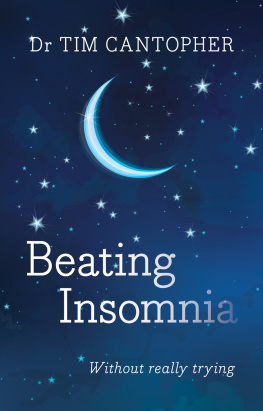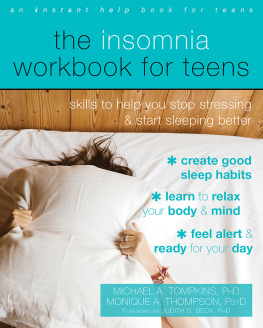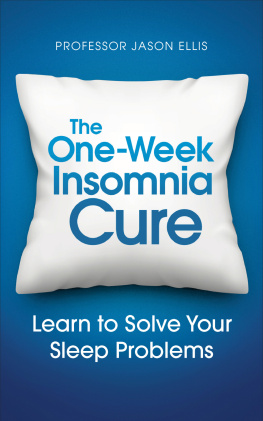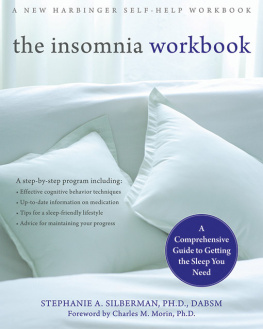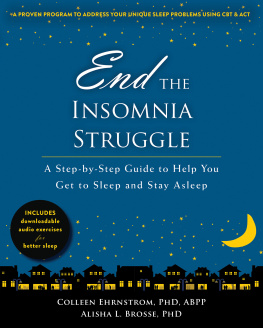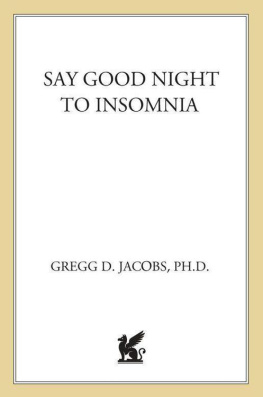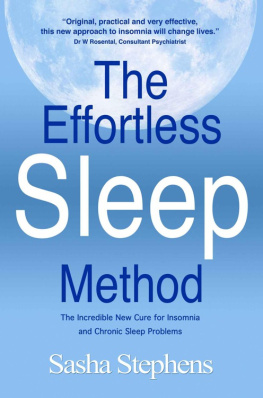AN INTRODUCTION TO INSOMNIA
D o you daydream of lying down and sleeping soundly through the night? Do you toss, turn, and stare at the ceiling, willing your body to fall asleep? If so, youre not alone. Millions of people just like you struggle with insomnia every night.
The first thing that may pop into your head when you hear the term insomnia is the inability to fall asleep, but the disorder manifests in many different ways as well. Though there are several different subcategories of insomnia, there are three main ways that it may affect you. Other manifestations of insomnia include having difficulty staying asleep once you doze off, or sleeping for a few hours and then waking up way too early.
For some, lack of sleep is a lifelong condition, but for others its just a temporary condition brought on by illness or circumstance. The length of time you suffer from insomnia is largely dependent on what causes it, and the treatment plan will be based on the type that you have.
The Two Types of Insomnia
- Transient Insomnia: This is by far the most common form of insomnia and will affect nearly everyone at some point. Transient insomnia is caused by temporary life circumstances such as short-term illness, stress, travel, or other environmental or physical factors.
- Chronic Insomnia: This type of insomnia is the one that really wreaks havoc on all areas of your life. Its generally caused by long-term physical or psychological issues and is extremely difficult (though not impossible) to treat.
Why Is Sleep Important?
Your body uses your sleep time to heal and regenerate. As a result, when you dont get enough quality sleep, there are numerous complications that can arise. Your appearance will obviously suffer. Your skin will become dull and youll probably have bags under your eyes. Depending on whether you have transient or chronic insomnia, different aspects of your health may suffer, too. Even missing one nights sleep will affect your ability to think clearly, drive, or perform tasks that require attention to detail.
Missing sleep on a regular basis can cause a host of physical and psychological side effects. Your immune system may become compromised, making you more susceptible to colds and other illnesses. You are also at a higher risk for psychological conditions such as mood and anxiety disorders. In short, if youre not sleeping well, your body cant perform well.
Whats Causing You to Lose Sleep?
Some people can sleep through anything, but others lose sleep at the drop of a hat. Environmental issues such as temperature, noise, or light can keep you awake, as can short-term physical issues such as a cold. Psychological issues such as job stress, depression, and bipolar disorder can also disrupt your sleep patterns.
However, insomnia may also be an indication of a number of other illnesses. People who suffer from chronic anxiety, depression, and ADHD often have difficulty sleeping. Physical conditions such as asthma, sleep apnea, cancer, and fibromyalgia also disrupt sleep patterns. Some of these conditions affect the chemicals in your brain, while others simply cause so much physical discomfort that its impossible to sleep well. In the latter case, pain medications may help.
On that note, there are also medications that can cause insomnia. If youre taking any of the following medications, youre at risk for developing the disorder:
Beta-blockers | Thyroid medications |
Asthma medications | Steroids |
Diet pills | Blood pressure medications |
Decongestants |
If you dont normally have issues sleeping well and suddenly develop insomnia after beginning any of these medications, talk to your doctor. Losing sleep is never good for you, and your doctor may want to adjust your dosages. If its an over-the-counter medication, either stop taking it or reduce your dosage. Never take more than what the package directs.
How Does My Body Regulate Sleep?
Youve probably heard the term internal clock at some time in your life, but what you may not have known is that you actually have one. In fact, its this internal clockcalled a circadian rhythmthat maps out your entire life. It determines when you eat, when you sleep, and when you wake up. When this rhythm gets disrupted, your entire schedule can be thrown into disarray.
The biggest problem with disrupting your circadian rhythm is that once it has been upset, its not always easy to fix. Well discuss this in more detail later, but for now, suffice it to say that you should maintain a regular sleep schedule if you want to avoid chronic insomnia. No deadline is worth sacrificing your health; when your body says its time to sleep, listen to it.
Is Insomnia Curable?
If your insomnia is caused by external factors, or even short-term internal factors, then chances are good that your insomnia will go away when those factors dissipate. If, however, your insomnia is caused by chronic physical or psychological factors, your odds of enjoying natural, healthy sleep any time soon are greatly diminished. The good news for those who fall into this second category is that there are several effective medications on the market that your doctor can prescribe for you. Or, if you dont want to add another pill to your medicine cabinet, you may find relief with relaxation techniques or counseling.
Simple adjustments to your sleep routine may prove helpful, too. Good sleep hygiene includes a number of physical and environmental factors that you can improve in order to better facilitate a good nights rest. In addition to adjusting your physical environment, changes to your exercise routine and diet are also part of good sleep hygiene.
Since there are so many factors that can trigger insomnia, nearly everyone will suffer from it at one point or another. Its an issue that plagues both men and women of all ages, and frequently resolves just as rapidly as it develops. The following pages will explain your condition, tell you why its so important to recover healthy sleep patterns, and offer solutions to help you get the rest that you need.
TRANSIENT VS. CHRONIC INSOMNIA
A s weve already discussed, there are two types of insomnia: transient and chronic. Depending on which type you suffer from, your treatment options and prognosis will vary. And to make things more complicated, the two categories are extremely broad, and both encompass a wide array of disorders and causes. Lets discuss these two types and how you can treat each of them. Later, well get into the different categories of insomnia that fall under each type.
DID YOU KNOW?About 10 percent of the population suffers from insomnia thats severe enough to interfere with day-today activities, with at least another 20 percent suffering from milder symptoms. Around 66 percent of chronic sufferers are adult women, and about half of all people over the age of 60 dont get enough good sleep. More than 10 million people in the United States alone use some form of sleep aid, and people who suffer from sleep deprivation are up to 35 percent more likely to become overweight.
Transient Insomnia
At one point or another, most people will suffer from some form of transient insomnia. This may manifest as the inability to fall asleep, the inability to stay asleep, or waking up extraordinarily early and being unable to go back to sleep. Transient insomnia is also referred to as secondary insomnia. This means that its induced by any number of external factors and is not a stand-alone condition. By definition it also lasts no longer than three weeks.

